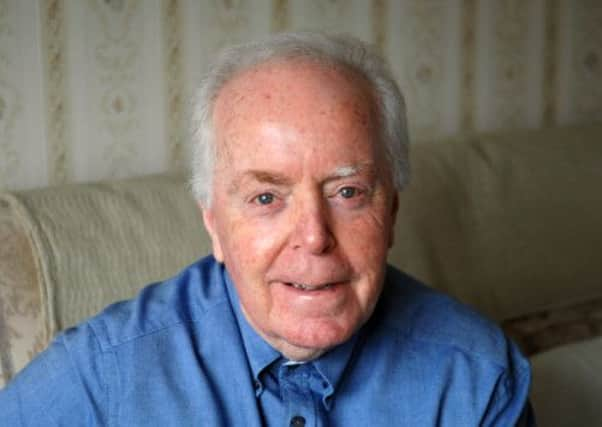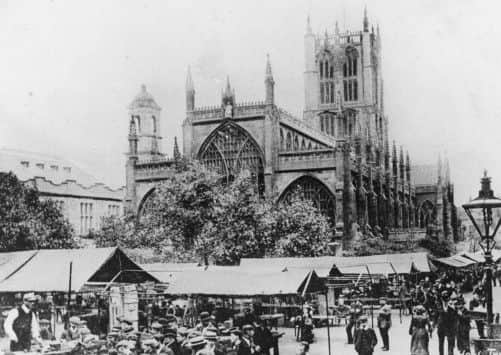City’s forgotten visitors


Between 1890 and 1914 it is estimated that two million Jews fled their homelands in Russia and Poland to head for a better life in the UK, US or South Africa.
The trigger for their migration was the assassination of Tsar Alexander II. Despite the lack of tangible evidence, the Jewish community was implicated in his death in 1881 and targeted through what became known as the pogroms.
Advertisement
Hide AdAdvertisement
Hide AdBy then millions were living in what was known as the Pale of Settlement, a huge area of western Russia, which had been set aside to prevent the Jewish community from spreading right across the country unless they committed to the Christian Orthodox religion.


When Alexander issued the May Laws, a series of harsh restrictions that were to stifle any attempt by the Jewish community to make headway in accruing capital and furthering their careers, including being taxed double the amount of other Russians and not being allowed to lease land, a harsh situation developed.
The Jewish community was left with little option but to seek their future elsewhere.
That’s where Hull author and historian Mike Ulyatt, a veteran of some 20 previous books on sport and local history in the city comes in. He was interested in the flight of the Eastern European Jewish community and his book Be Still and Know Thyself More serves as both a document of how many of them arrived in Hull and a picture of how life would have been for those who either stayed in the city, moved to Leeds and Manchester, or were simply one step closer to the US.
Advertisement
Hide AdAdvertisement
Hide Ad“It was a story that I’d heard about but of which nothing had actually been written. Whilst many left from either St Petersburg, Riga or Libau for London the next biggest influx came to Hull. In most cases those who came here didn’t stay very long. Hull was effectively a staging post for getting across to Liverpool and finally reaching what they referred to as the ‘Goldene Medina’ of the United States.
“I found there was a great deal of regimentation when they arrived in Hull. The Hull authorities were very keen on moving them straight out of the city and on to the train from Paragon Station. They were worried about the sanitary conditions that they had experienced on board ship for five days and didn’t want any chance of cholera, typhus, smallpox or dysentery developing.
“Ships would come into Victoria Dock and Humber Dock around 5am and the authorities would get them processed at the immigration centre on Anlaby Road and away by 5pm the same day. The immigration office has variously been a dockers club and railway club since those times and today it is The Lair social club.
“The Harry Lazarus Hotel in Posterngate in Hull’s Old Town area was used as a lodging house en route to the States and is commemorated with a blue plaque today.”
Advertisement
Hide AdAdvertisement
Hide AdBut it wasn’t all plain sailing for some of those who had spent all they had on fleeing Russia.
“It seems a lot of them were fiddled out of their travel cost, often believing that they had paid for a boat ticket that would take them from Russia right across to the United States but they found that it only took them as far as Hull.
“They also had their names changed too. In a number of cases there doesn’t appear to have been an interpreter on hand at the immigration office and the immigration officer would go down the line renaming them. It seems the names would have been made up on the spot, so if for instance you had a gold tooth you became Goldstone.
“Where some Jews already had family in Hull they had an opportunity to stay, build up some income and then move on, although the chances of them having family members here were not great. There had only been around 60 Jewish families in Hull prior to this huge influx.
Advertisement
Hide AdAdvertisement
Hide Ad“Nevertheless the Jewish community in the city grew considerably and by 1900 there were around 2,000. The biggest number originally lived in Osborne Street, Myton Street, Nile Street, Porter Street and others around the city centre before moving out to Anlaby Road, Coltman Street and on to Kirkella.
“The shipping line that effectively seemed to have cornered the market in transportation of Eastern European Jews to Hull was the Wilson Line, which later became the famous Ellerman-Wilson Line. They built ships on the back of their increased trade.”
Mike first came up with the idea of writing his book about 30 years ago but admits to having shelved it at the time because he received some negative feedback from the Jewish community who were concerned about anti-semitism.
“This isn’t a religious book. It’s a local history book. I was brought up a Catholic, but I have made many good business and sporting friends who are of the Jewish faith. When I talked with some Jewish elders about my thoughts years ago they felt there was a lot of anti-semitism in Hull. If there is I’ve never seen it, but that put me off initially. Then I wrote to the Jewish Watchman magazine and started picking up on one or two contacts.
Advertisement
Hide AdAdvertisement
Hide Ad“Bill Williams, a lecturer at the University of Manchester and an expert in Jewish migration helped me greatly and put me in touch with families who had come through Hull to eventually settle in the US. I probably received more information outside of Hull than I did from within the city.”
Mike’s conjecture in the book is what would have happened if the authorities in Hull had not been so keen on shipping the Jewish community out immediately – and if they had stayed in greater numbers would Hull have benefited far more?
“What if people like the Max Factor family had come through Hull? Would they have stayed and built up their fortune here, helping with employment in the city if we had been more welcoming? Could Michael Marks have come through here and stayed, setting up his Penny Bazaar in Hull rather than Leeds, leading to the Marks & Spencer business?
“We will never know for sure, but what we do know is that Hull played an important part, as a seaport, in helping the Eastern European Jewish community find a better life away from tyranny.”
Be Still and Know Thyself More – The Flight of the Eastern European Jews to Hull & Beyond by Michael E Ulyatt is out now, priced £14. To order from the Yorkshire Post Bookshop call 01748 821122.